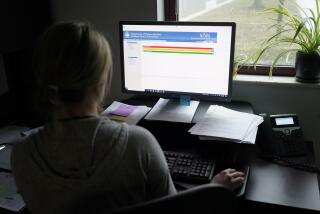Foster Moms Get Off Welfare, On Salary
ROYAL OAK, Mich. — Fourteen women who were once on welfare have found jobs doing what they know best--being moms.
They have been taken off government assistance and are earning $21,000 a year as foster mothers to disabled youngsters under a state program called LIFE (Living in Family Environments).
“These women are capable of doing something, but for the most part, they’re best at being moms and they’re happy being moms,” said state Rep. Shirley Johnson, who helped to get funds allocated for the program.
“I was scared to death at the beginning. How would you match the right mom with the right child? But it has worked beautifully.”
The 3-year-old program, which operates primarily on a $200,000 grant from the state Department of Mental Health, was the idea of Mounir Sharobeem, president of the Judson Center in this Detroit suburb. The center helps abused and neglected children and disabled adults.
“Instead of stereotyping welfare recipients as lazy, let’s train the families, let them select a developmentally disabled child and use their time and energy more effectively,” Sharobeem said.
“People said we would be endangering handicapped children by putting them with welfare families, but these families have been doing a great job with them, and it’s not easy.”
Sharobeem said that keeping one child in an institution costs the state mental health agency $45,000 a year, and keeping a family of four on welfare costs the state $16,000 a year.
The children also get more personal attention in a private home than in an institution, even though there is no father in most of the foster homes, Sharobeem said.
The foster mothers are screened and licensed by the Judson Center and receive training in the care of disabled children, said Diane Devine-Abdullah, program director.
“They go through a seven-day, 28-hour training, then 20 hours of home training in a current foster home,” she said. “We have four more families ready and waiting for placement.”
The trained women are matched with children living in Michigan institutions. The average age of the youngsters is between 15 and 16, Devine-Abdullah said.
C. Patrick Babcock, state social services director, said that officials want to expand the program, but Johnson said that budget constraints won’t allow a full-scale program.
One mother, Darlene Gisel of Warren, cares for 11-month-old William, who was born with tuberculosis of the brain. His condition has been stabilized, but could leave him retarded or with a learning disability.
“He was in the hospital six months before I took him,” Gisel said. “He didn’t respond at all. He’s gotten farther than they ever thought he would.
“There’s a lot of joy in watching them grow. These are kids who probably wouldn’t have had a chance in life.”
Gisel said that her mother also was a foster mom who worked with handicapped children.
“I knew I wanted to deal with handicapped kids,” she said. “They need a little more of a chance. I think we can show that they can learn and they can live a normal life with a disability.”
Mothers in the program also find that the salary allows them to provide for their own children better.
Bertha Crawford is foster mother to Dorothy, 17, who cannot dress herself or talk. Crawford also has two teen-agers of her own.
“I feel good about helping someone else,” Crawford said. “It also gave me the chance to send my daughter on her senior trip. I couldn’t have afforded it without the program.”
More to Read
Sign up for Essential California
The most important California stories and recommendations in your inbox every morning.
You may occasionally receive promotional content from the Los Angeles Times.










